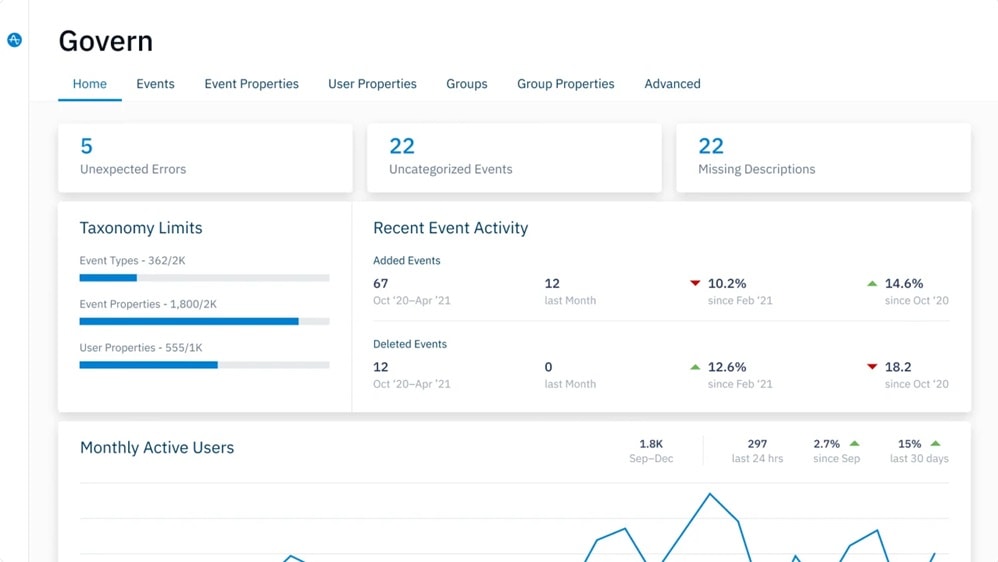Mixpanel vs Amplitude compared: Choosing the best analytics tool for your needs
- 01Mixpanel vs Amplitude: overview
- 02What's the difference between Mixpanel and Amplitude?
- 03Mixpanel pros and cons
- 04Amplitude pros and cons
- 05Mixpanel compared to Amplitude
- 06Amplitude compared to Mixpanel
- 07Features comparison
- 08Mixpanel vs Amplitude: Which is the best for your business?
- 09Promotions on Data Analytics software
- 10Alternatives to Mixpanel & Amplitude
Access up to $50,000 savings on Mixpanel & $183 on Amplitude
Access up to $50,000 savings on Mixpanel & $183 on Amplitude
Effective data analytics is crucial for understanding customer behavior and driving business growth, especially in the digital age. However, selecting the right analytics platform can be a daunting task, with numerous options each offering a unique set of features and tools. Two of the leading platforms in this space are Mixpanel and Amplitude. Both are renowned for their advanced data analytics capabilities, but they cater to different needs and preferences.
In this article, we delve into a comprehensive comparison between Mixpanel and Amplitude. We will explore their features, pricing models, and key differences to help you determine which platform aligns best with your business objectives. Whether you are a startup looking to understand user behavior, or an established enterprise seeking to refine your data-driven strategies, this comparison will provide valuable insights to guide your decision-making process.
Mixpanel vs Amplitude: overview
Mixpanel and Amplitude are two leading players in the field of product analytics platforms, each offering its own unique set of features tailored to meet the diverse requirements of businesses looking to gain insights into user behavior and optimize their digital products.
Mixpanel is renowned for its user-centric approach to analytics, providing tools that allow businesses to track user interactions with their applications or websites in detail. It specializes in event tracking, funnel analysis, and cohort analysis, making it an ideal choice for companies seeking to understand how users engage with their products at a granular level. On the other hand, Amplitude offers a robust analytics solution with a focus on user behavioral analysis and product intelligence. It provides a comprehensive view of user journeys, user segmentation, and retention analysis, making it an excellent choice for businesses looking to optimize user experiences and product features.
Now, let's dive into the Mixpanel vs. Amplitude comparison to assist you in making an informed decision when selecting the most suitable platform for your specific product analytics and user engagement needs.
What's the difference between Mixpanel and Amplitude?


Mixpanel and Amplitude are both prominent players in the realm of product analytics, each with its own strengths and differences to consider when choosing the right platform for your analytics needs.
One significant difference between Mixpanel and Amplitude is their approach to user analytics. Mixpanel is renowned for its event-driven analytics, focusing on tracking specific user interactions within your product. This means you can dive deep into understanding how users engage with individual features and events. Mixpanel excels in providing detailed insights into user behavior, making it a preferred choice for companies that want to closely monitor and optimize specific user actions.
On the other hand, Amplitude takes a more comprehensive approach to user analytics. It emphasizes user behavior analysis and offers a holistic view of user journeys and product usage. Amplitude's strength lies in its ability to segment users, create behavioral cohorts, and perform robust retention analysis. If your goal is to understand broader user trends and the overall performance of your product, Amplitude is well-suited for such needs.
Another critical distinction lies in the pricing models of Mixpanel and Amplitude. Mixpanel offers a tiered pricing structure based on the number of tracked users and data points, making it accessible for both small startups and large enterprises. In contrast, Amplitude uses a consumption-based pricing model, where you pay based on the volume of data you analyze. This can be advantageous for businesses with fluctuating data needs, but it's essential to carefully assess your usage to manage costs effectively.
Furthermore, integrations play a role in your choice between Mixpanel and Amplitude. Mixpanel offers a wide array of integrations, including popular tools like Slack, Salesforce, and Zendesk. Amplitude also provides integrations with various platforms, allowing you to connect it with your existing tech stack seamlessly. It's crucial to review the specific integrations offered by each platform to ensure they align with your workflow and data sources.
Mixpanel pros and cons
What are the advantages of Mixpanel?
- Event tracking: Mixpanel excels in event-driven analytics. It allows you to track specific user interactions and events within your product, providing detailed insights into how users engage with features. This level of granularity helps you understand user behavior on a granular level, enabling you to make data-driven decisions to improve your product.
- Funnel analysis: Mixpanel offers robust funnel analysis capabilities, allowing you to create and visualize conversion funnels. This feature is valuable for identifying drop-off points in user journeys and optimizing your product's conversion paths.
- Cohort analysis: Mixpanel enables you to create cohorts of users based on specific criteria, such as sign-up date or behavior. This helps you analyze and compare the behavior of different user groups over time, facilitating targeted marketing and personalized user experiences.
- A/B testing: Mixpanel provides tools for A/B testing, allowing you to experiment with different variations of your product and measure their impact on user behavior. This helps you optimize features and user interfaces for better results.
- Integrations: Mixpanel offers a wide range of integrations with third-party tools and services, making it easy to connect your analytics data to other parts of your tech stack, such as CRM systems, email marketing platforms, and more.
What are the disadvantages of Mixpanel?
- Learning curve: Mixpanel can be complex for beginners, and it may take time to fully grasp its features and capabilities. Proper training and onboarding are essential to use Mixpanel effectively.
- Limited free plan: Mixpanel's free plan has limitations, such as a restricted number of data points and users. To access advanced features and accommodate larger datasets, you may need to upgrade to a paid plan, which can be costly for some businesses.
- Costly for high-volume usage: Mixpanel charges based on the number of data points tracked, and high-traffic applications with extensive event tracking can incur significant costs. Businesses with large user bases and high data volumes may find Mixpanel expensive.
- Data privacy and compliance: Ensuring that you handle user data in compliance with privacy regulations (such as GDPR or CCPA) can be challenging when using Mixpanel, as it requires careful configuration and data handling practices.
- Limited behavioral cohort analysis: While Mixpanel is strong in creating cohorts based on user properties, it may have limitations in performing behavioral cohort analysis compared to other tools specialized in this area.
Compare Mixpanel to other tools
Amplitude pros and cons
What are the advantages of Amplitude?
- User behavior analysis: Amplitude excels in providing a comprehensive view of user behavior and product usage. It allows you to analyze user journeys, create behavioral cohorts, and perform robust retention analysis, helping you understand how users interact with your product over time.
- Cohort analysis: Amplitude offers powerful cohort analysis capabilities, allowing you to segment users based on various criteria, including user behavior, demographics, and more. This feature helps you identify trends, track user engagement, and target specific user groups effectively.
- Integrations: Amplitude provides a wide range of integrations with popular third-party tools and services, making it easy to connect your analytics data to other parts of your tech stack, such as CRM systems, email marketing platforms, and data warehouses.
- Behavioral analytics: Amplitude offers advanced behavioral analytics features, such as event tracking, event funnels, and user path analysis. These tools enable you to gain deep insights into how users interact with specific features and pathways within your product.
- Scalability: Amplitude is suitable for businesses of all sizes, from startups to large enterprises. Its pricing model allows you to scale up as your user base and data needs grow, making it a flexible choice for companies with evolving requirements.
What are the disadvantages of Amplitude?
- Pricing model: Amplitude's pricing is based on data volume, which means you pay based on the amount of data you analyze. While this can be advantageous for some businesses, it may lead to higher costs for those with large and constantly growing datasets.
- Learning curve: Amplitude can be complex for beginners, and it may take time to become proficient in using its features effectively. Proper training and onboarding are essential to maximize its benefits.
- Data privacy and compliance: Handling user data in compliance with privacy regulations (such as GDPR or CCPA) can be challenging with Amplitude, as it requires careful configuration and data handling practices to ensure compliance.
- Limited real-time analytics: Amplitude's real-time analytics capabilities may not be as robust as some other analytics tools, which could be a drawback for businesses requiring up-to-the-minute insights.
- Customization complexity: While Amplitude offers a wide range of features, customizing complex analysis and reporting may require advanced skills and dedicated resources, which could be a challenge for smaller teams or businesses with limited technical expertise.
Compare Amplitude to other tools
Mixpanel compared to Amplitude
Mixpanel and Amplitude are both robust product analytics platforms. Mixpanel excels in event-driven analytics, offering detailed insights into user interactions with your product. It is ideal for those who want to closely monitor specific user actions.
On the other hand, Amplitude provides a broader view of user behavior, emphasizing user journeys and product usage analysis. It excels in user segmentation and retention analysis. Mixpanel may be preferable for those seeking granular insights, while Amplitude suits businesses looking for comprehensive user behavior understanding. Both platforms offer integrations but differ in pricing models, making a careful evaluation essential to choose the right fit.
Is Mixpanel better than Amplitude?
When considering whether Mixpanel is better than Amplitude, it's crucial to align the choice with specific business needs. Both platforms are leaders in product analytics; however, their strengths cater to different analytical preferences and objectives. Mixpanel's forte lies in its depth of event-driven analytics, making it an excellent tool for businesses focused on scrutinizing minute user interactions.
In contrast, Amplitude offers a wider lens on user behavior, excelling in mapping out user journeys and analyzing product usage, ideal for enterprises seeking a holistic view of user engagement and retention. The decision ultimately hinges on whether a business prioritizes detailed event tracking or a comprehensive overview of user patterns.
What is Mixpanel best used for?
Mixpanel is best used for in-depth product analytics, focusing on tracking and understanding user behavior within web and mobile applications. It excels in event-driven analytics, allowing businesses to monitor specific user interactions and features.
Mixpanel is particularly valuable for optimizing user experiences, identifying conversion bottlenecks, and conducting A/B testing to improve product functionality. It helps companies gain insights into user engagement, funnel analysis, and cohort analysis, making it a go-to tool for data-driven decision-making and user-centric product development. Mixpanel is favored by businesses aiming to enhance their product's performance and user satisfaction through precise, event-level analytics.
Can Mixpanel replace Amplitude?
Mixpanel and Amplitude are both powerful product analytics platforms, but whether Mixpanel can replace Amplitude depends on your specific needs and preferences. While both tools offer robust analytics capabilities, they have different strengths. Mixpanel excels in event-driven analytics and is ideal for businesses seeking granular insights into user interactions.
Amplitude, on the other hand, provides a broader view of user behavior, emphasizing user journeys and retention analysis. To determine if Mixpanel can replace Amplitude, evaluate your analytics goals, data volume, and budget constraints carefully. It's advisable to conduct a thorough comparison and choose the tool that aligns best with your requirements.
Is Mixpanel cheaper than Amplitude?
Mixpanel and Amplitude have distinct pricing models, making it challenging to definitively state whether one is cheaper than the other. Mixpanel’ pricing model typically charges based on the number of data points or events tracked, while Amplitude's pricing is based on data volume.
For businesses with low event counts but high data volume, Mixpanel’s pricing may be more cost-effective. Conversely, for companies with extensive event tracking and lower data volume, Amplitude's pricing may offer savings. Ultimately, the cost comparison depends on your specific usage patterns, so it's crucial to assess both platforms' pricing structures and evaluate which aligns better with your analytics needs and budget.
Is there a better Data Analytics software than Mixpanel?
When it comes to product analytics and user behavior tracking, it's essential to explore whether there might be a better software than Mixpanel for your specific needs.
Several alternatives to Mixpanel in the product analytics domain include Amplitude, Heap Analytics, Mixamo, and Pendo. Each of these platforms offers its unique set of features and strengths.
The choice of a product analytics tool hinges on your organization's specific analytics goals, data volume, user behavior analysis requirements, and budget considerations. While Mixpanel excels in event-driven analytics and user interaction tracking, other tools may provide different perspectives, broader analytical capabilities, or more tailored solutions that align better with your product optimization and user engagement strategies.
1 year free on Mixpanel
Get 1 year free on Mixpanel and up to $50,000 savings with Secret.
Amplitude compared to Mixpanel
Amplitude and Mixpanel are both formidable product analytics platforms, but they have distinct approaches and strengths. Amplitude focuses on comprehensive user behavior analysis and offers extensive cohort and retention analysis tools. It excels at providing a holistic view of user journeys and user segmentation.
Mixpanel, on the other hand, specializes in event-driven analytics, allowing in-depth tracking of specific user interactions. It's ideal for businesses seeking detailed insights into feature usage and funnel analysis. The choice between Amplitude and Mixpanel depends on your specific analytics goals and preferences. Amplitude offers a broader perspective, while Mixpanel excels in granular event tracking and analysis.
Is Amplitude better than Mixpanel?
Determining whether Amplitude is better than Mixpanel depends on the analytic priorities and specific needs of a business. Amplitude's strength lies in its ability to offer a wide-angle view of user behavior, making it particularly suited for organizations that require a comprehensive understanding of user journeys and segmentation. Its tools for cohort and retention analysis are extensive, facilitating a deep dive into user engagement over time.
In contrast, Mixpanel's focus on event-driven analytics caters to those who need to meticulously track and analyze specific user interactions, offering detailed insights into feature usage. Therefore, the preference for Amplitude over Mixpanel is not a matter of one being universally superior, but rather a question of which platform aligns better with a company's strategic objectives. While Amplitude provides an expansive view of user behavior, Mixpanel allows for a more focused approach.
What is Amplitude best used for?
Amplitude is best used for comprehensive product analytics and user behavior analysis. It excels in providing insights into how users interact with digital products, allowing businesses to understand user journeys, segment users effectively, and track retention over time. Amplitude's robust cohort analysis capabilities enable businesses to target specific user groups and optimize their product features accordingly.
It's ideal for organizations looking to gain a deep understanding of user behavior, improve user experiences, and make data-driven decisions to enhance their digital products. Amplitude's focus on user-centric analytics makes it a valuable tool for product managers, marketers, and developers alike.
Can Amplitude replace Mixpanel?
Whether Amplitude can replace Mixpanel depends on your specific analytics needs and preferences. Both tools offer powerful product analytics capabilities but with different strengths. Amplitude is known for its comprehensive user behavior analysis, emphasizing user journeys and cohort analysis. It's an excellent choice for businesses seeking a holistic view of user engagement.
In contrast, Mixpanel specializes in event-driven analytics, making it ideal for granular event tracking and detailed user interaction insights. To determine if Amplitude can replace Mixpanel, assess your analytics goals, data volume, and budget considerations. Consider conducting a thorough comparison to find the tool that aligns best with your requirements.
Is Amplitude cheaper than Mixpanel?
Determining whether Amplitude is cheaper than Mixpanel depends on various factors. Both platforms have different pricing models. Amplitude’s pricing structure typically charges based on data volume, while Mixpanel's pricing is often based on the number of events or data points tracked. The cost-effectiveness of each platform largely depends on your specific usage patterns and the scale of data you need to analyze.
Smaller businesses or those with lower event counts but higher data volume may find Amplitude more cost-effective, whereas larger enterprises with extensive event tracking may benefit from Mixpanel's pricing structure. To make an accurate cost comparison, carefully evaluate both platforms' pricing models based on your specific needs.
Is there a better Data Analytics software than Amplitude?
When exploring alternatives to Amplitude, it's essential to assess whether there might be a software that better suits your specific analytics requirements.
Several notable competitors to Amplitude in the product analytics and user behavior tracking domain include Mixpanel, FullStory, Google Analytics, and Hotjar.
The choice of a product analytics tool hinges on your unique analytical goals, data volume, and user behavior analysis needs. While Amplitude excels in comprehensive user behavior analysis and cohort analysis, other platforms may offer different strengths such as granular event tracking, A/B testing, or specialized analytics for specific industries or use cases.
25% off the Growth plan for 1 year on Amplitude
Get 25% off the Growth plan for 1 year on Amplitude and up to $183 savings with Secret.
Features comparison
Mixpanel's Targeted Communication Sets It Apart from Amplitude

Mixpanel's distinctive value lies in its ability to not only provide insights but also facilitate targeted communication with users based on their behavior and interactions. With Mixpanel, businesses can send personalized messages, emails, or push notifications to specific user segments, fostering active engagement.
For instance, a mobile gaming app using Mixpanel can identify users who frequently play a specific game level but haven't completed it and send them a personalized message with tips and incentives to encourage progress. While Amplitude offers invaluable insights into user preferences, it lacks the direct communication mechanisms that Mixpanel offers. If your focus is on active customer engagement, Mixpanel excels in this aspect, setting it apart from Amplitude.
Amplitude Outperforms Mixpanel in Integration Versatility

When it comes to integration possibilities, both Mixpanel and Amplitude offer a variety of options to connect with other software tools seamlessly. However, Amplitude stands out as the superior choice in this category. Amplitude's extensive integration ecosystem covers a broader spectrum of third-party services, enhancing the overall data analytics experience.
For instance, it seamlessly integrates with popular platforms like Slack, Jira, and Intercom, streamlining data flow and analysis. This wide-reaching compatibility makes Amplitude the go-to choice for startups that heavily rely on data from various software tools. If you seek a tool that excels in integration versatility, Amplitude proves more advantageous compared to Mixpanel.
Mixpanel's A/B Testing Superiority for Data-Driven Decision-Making

While both Mixpanel and Amplitude offer A/B testing tools, Mixpanel takes the lead with its comprehensive A/B testing capabilities. Mixpanel's user-friendly interface facilitates the swift setup of various versions of your app or website for comparison. For instance, you can effortlessly create multiple variations of a feature to analyze user engagement and conversion rates.
The ability to conduct experiments seamlessly enables businesses to make data-driven decisions promptly. While Amplitude also offers A/B testing, Mixpanel's intuitive A/B testing tools make it the preferred choice for those seeking a robust solution to optimize user experiences and product features.
Amplitude's Personalized Recommendations Enhance User Experience

Amplitude distinguishes itself from Mixpanel by leveraging its robust analysis and machine learning capabilities to provide personalized recommendations. This feature tailors every interaction with customers and prospects, creating a unique user experience based on individual preferences, behavior, and journey mapping.
For instance, Amplitude can recommend specific product features or content to users based on their past interactions, increasing engagement and satisfaction. It can also predict churn and suggest retention strategies, helping businesses proactively retain customers. Mixpanel, while offering valuable insights, lacks Amplitude's advanced personalization capabilities. If your focus is on creating tailored user experiences, Amplitude's personalized recommendations make it the preferred choice for optimizing user engagement.
Amplitude's Data Governance Excellence Surpasses Mixpanel

While both Mixpanel and Amplitude offer robust analysis features, a significant distinction lies in their approach to data management and governance. Mixpanel primarily focuses on analytics and event tracking but doesn't directly address data management needs.
On the other hand, Amplitude excels in centralizing your data, managing access permissions, and ensuring an optimal level of security. This centralized approach simplifies data governance, making it easier to maintain high data integrity levels and comply with data privacy regulations. For instance, Amplitude provides tools to control who can access and manipulate data, ensuring that sensitive information is protected and used responsibly. If robust data governance is a priority, Amplitude outperforms Mixpanel in this regard.
Amplitude Excels Over Mixpanel in User-Friendliness

In terms of ease-of-use, both Mixpanel and Amplitude offer user-friendly interfaces and comprehensive dashboards. However, Amplitude surpasses Mixpanel in terms of user-friendliness. Amplitude's intuitive design and straightforward event tracking make it an excellent choice for beginners and experienced users alike. For example, setting up event tracking for actions like user sign-ups or feature usage is a seamless process in Amplitude, requiring just a few simple steps.
Additionally, Amplitude provides extensive documentation and robust community support, enhancing its user-friendliness. While Mixpanel also offers a user-friendly experience, Amplitude's overall interface and usability make it the more accessible tool for users of all skill levels.
Mixpanel and Amplitude: Robust Cohort Analysis for Enhanced User Insights

Mixpanel and Amplitude offer robust cohort analysis features, making them indispensable for businesses seeking a deep understanding of user engagement. With both tools, users can segment their audience based on specific attributes or behaviors, providing detailed insights into how different user segments interact with their platform.
For example, e-commerce businesses can create cohorts of first-time buyers and returning customers to compare their purchasing behaviors. This allows for targeted marketing and product optimization. While both platforms excel in this regard, the choice between Mixpanel and Amplitude may depend on other factors like event tracking, integration capabilities, or pricing models.
Subscribe to our newsletters.
No FOMO here. Stay up-to-date on all the latest deals and news with our monthly newsletter straight to your inbox like 118,000+ entrepreneurs (+ Get 10% off on on our Premium Membership!)
Mixpanel vs Amplitude: Which is the best for your business?
Mixpanel is the best tool for you if:
- You prioritize detailed event tracking and want to dive deep into specific user actions and interactions within your product, offering precision in understanding user engagement.
- Your team requires a robust funnel analysis tool, keen on optimizing conversion rates by closely monitoring each step of the user journey and identifying bottlenecks.
- Customization and flexibility in data analysis are key, as Mixpanel allows for personalized dashboards and reports tailored to your unique business questions and metrics.
- You seek to integrate your analytics platform seamlessly with other tools, as Mixpanel offers extensive integrations, enhancing your data's utility across various business functions.
- Real-time data is crucial for your decision-making process, with Mixpanel providing immediate insights into user actions, helping you quickly adapt and respond to trends.
Amplitude is the best tool for you if:
- You need comprehensive insights into user behavior patterns, with a focus on understanding the entire user journey and segmenting users based on their interactions with your product.
- Cohort analysis and retention strategies are central to your business, as Amplitude excels in tracking user groups over time, identifying trends, and improving long-term user engagement.
- Scalability and handling large volumes of data efficiently are your priorities, making Amplitude ideal for enterprises with extensive user bases and complex data analysis needs.
- You value a user-friendly interface that simplifies complex data analysis, offering intuitive visualization tools and dashboards that make data accessible to team members of all skill levels.
- Integration with other data sources and tools is crucial for a holistic analysis approach, as Amplitude seamlessly connects with various platforms, enriching your data ecosystem.
Alternatives to Mixpanel & Amplitude
Promotions on Data Analytics software
Start saving on the best SaaS with Secret.
Secret has already helped tens of thousands of startups save millions on the best SaaS like Mixpanel, Amplitude & many more. Join Secret now to buy software the smart way.















